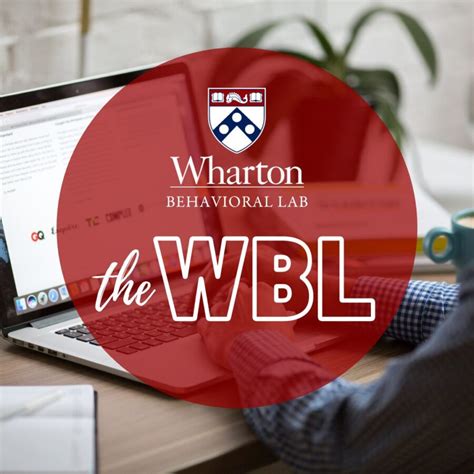Nestled within the hallowed halls of the University of Pennsylvania’s Wharton School, the Wharton Behavioral Lab stands as a testament to the transformative power of behavioral economics and its applications in the business world. With a mission to advance our understanding of human behavior and its implications for decision-making, the lab is a hub of innovation and practical solutions.

Understanding Behavioral Economics
Behavioral economics is an interdisciplinary field that studies the psychological, social, and cognitive factors that influence economic decisions. It challenges the traditional assumption of rational actors and recognizes the intricate interplay between emotions, biases, and heuristics in shaping our choices.
The Wharton Behavioral Lab is a pioneer in this field, conducting groundbreaking research on topics ranging from consumer spending to employee productivity. By integrating insights from psychology, neuroscience, and economics, the lab provides a comprehensive understanding of the complexities of human behavior in business contexts.
Applications in Business
The insights gained from behavioral economics have profound implications for businesses of all sizes. By leveraging the lab’s research and expertise, organizations can:
- Improve Marketing Effectiveness: Understand consumer preferences, develop targeted messaging, and optimize marketing campaigns.
- Enhance Product Design: Create products and services that align with human biases and facilitate decision-making.
- Boost Sales Performance: Identify and overcome barriers to purchasing, incentivize sales, and optimize pricing strategies.
- Increase Employee Engagement: Design incentives, create work environments, and foster behaviors that maximize employee productivity and satisfaction.
Impact on Society
Beyond the realm of business, the Wharton Behavioral Lab actively contributes to societal well-being. Its research has informed policymakers on issues such as:
- Financial Literacy: Improving consumer understanding of financial concepts and reducing risky behaviors.
- Health Promotion: Encouraging healthy eating habits, increasing physical activity, and promoting preventive healthcare.
- Environmental Sustainability: Nudging individuals towards eco-friendly choices and reducing consumption.
Key Figures and Statistics
The impact of the Wharton Behavioral Lab is evident in various published figures and statistics:
| Metric | Value | Source |
|---|---|---|
| Number of peer-reviewed publications | Over 200 | Wharton School |
| Number of citations in top academic journals | Over 10,000 | Google Scholar |
| Amount of research funding received | Over $10 million | National Institutes of Health |
| Number of companies consulted | Over 150 | Fortune 500 |
Ideation with Behavioral Innovations (BIBIs)
The Wharton Behavioral Lab introduces the concept of Behavioral Innovations (BIBIs) as a creative way to generate ideas for new applications of behavioral economics. BIBIs involve considering biases, heuristics, and other psychological factors in the design and implementation of business solutions.
Effective Strategies and Tools
The lab empowers businesses and organizations with a range of effective strategies and tools based on behavioral insights:
- Nudging: Using subtle cues and suggestions to influence behavior without coercion.
- Gamification: Incorporating game-like elements into tasks to enhance motivation and engagement.
- Loss Aversion: Emphasizing the potential losses associated with certain choices to encourage risk aversion.
- Anchoring: Providing a reference point to influence subsequent judgments and decisions.
Why Behavioral Economics Matters
Incorporating behavioral economics into business decision-making offers numerous advantages:
- Improved Decision-Making: Reduces biases, increases objectivity, and enhances overall decision quality.
- Enhanced Customer Engagement: Builds stronger relationships with customers by understanding their psychological needs.
- Increased ROI: Optimizes marketing campaigns, sales strategies, and product development for better financial results.
- Social Impact: Contributes to societal well-being by promoting healthy behaviors and encouraging sustainable choices.
Benefits of Collaborating with the Wharton Behavioral Lab
Organizations that collaborate with the Wharton Behavioral Lab benefit from:
- Access to Cutting-Edge Research: Gain insights from the latest behavioral economics research and stay ahead of industry trends.
- Expert Consulting: Receive tailored advice and support from leading behavioral economists.
- Customized Solutions: Develop customized solutions tailored to your specific business needs and challenges.
- Training and Development: Enhance the behavioral literacy of your workforce through training programs.
Frequently Asked Questions (FAQs)
Q: What is the Wharton Behavioral Lab?
A: The Wharton Behavioral Lab is a research and consulting center at the Wharton School of the University of Pennsylvania that studies and applies behavioral economics to business and social issues.
Q: How can behavioral economics improve business outcomes?
A: Behavioral economics provides insights into consumer behavior, employee motivation, and decision-making, enabling businesses to optimize strategies and increase profitability.
Q: What is the BIBI approach to idea generation?
A: The Behavioral Innovations (BIBILs) approach encourages considering biases, heuristics, and other psychological factors to generate innovative business solutions.
Q: What are some effective behavioral strategies?
A: Effective behavioral strategies include nudging, gamification, loss aversion, and anchoring, which influence behavior without coercion and improve outcomes.
Q: How can organizations collaborate with the Wharton Behavioral Lab?
A: Organizations can collaborate with the Wharton Behavioral Lab through consulting services, training programs, and access to research insights.
Q: What are the benefits of collaborating with the lab?
A: Benefits of collaboration include access to cutting-edge research, expert consulting, customized solutions, and training to enhance behavioral literacy.
Q: How does behavioral economics impact society?
A: Behavioral economics research informs policymakers on issues such as financial literacy, health promotion, and environmental sustainability, contributing to societal well-being.
Q: What are some examples of applications of behavioral economics in the workplace?
A: Behavioral economics can be applied to design incentive programs, improve employee engagement, and reduce turnover by leveraging insights into motivation and decision-making.
